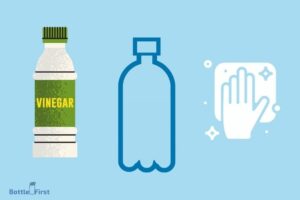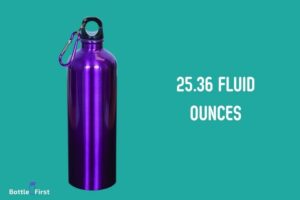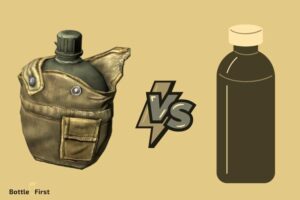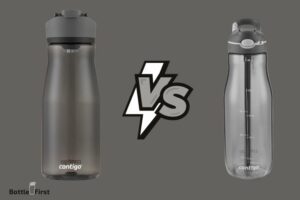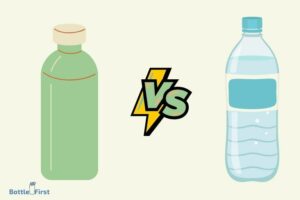Glass Vs Plastic Water Bottle – Comparison
When comparing glass vs plastic water bottles, it’s clear that glass bottles are generally the healthier and more eco-friendly option.
Unlike many plastic bottles, glass bottles are free from harmful chemicals like BPA and phthalates, which can leach into your water when exposed to heat or over time.
Not to mention, glass bottles are more sustainable and less harmful to the environment than plastic ones.
Glass water bottles are made from natural materials and are 100% recyclable, which means they have a significantly lesser impact on the environment compared to plastic bottles.
Plus, glass bottles don’t retain or impart flavors, ensuring that your water tastes crisp and clean every time.
On the opposite side, plastic bottles are known for their lightweight convenience, but the downsides including possible chemical leaching and environmental harm often outweigh the benefits.
In conclusion, while glass water bottles might be a bit heavier and potentially more fragile, their benefits to both your personal health and the environment make them a superior option.
They are chemical-free, sustainable, and ensure your water tastes as it should. Plastic bottles, although practical in certain situations, pose potential health risks due to chemical leakage and are less environmentally friendly.
Comparison of Glass and Plastic Water Bottles
| Aspect | Glass Water Bottle | Plastic Water Bottle |
|---|---|---|
| Durability | Less Durable | More Durable |
| Weight | Heavier | Lighter |
| Taste | Better | Might be Affected |
| Price | More Expensive | Less Expensive |
| Eco-Friendly | Yes | Depends on Type |
| Safety | Chemical Free | May Contain BPA |
Key Takeaway
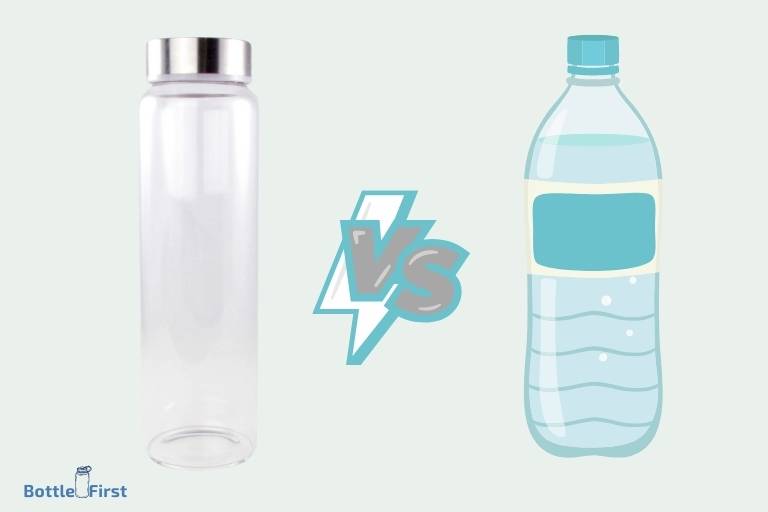
Five Facts About Glass and Plastic Water Bottles
Benefits Of Glass Water Bottles
Glass Vs Plastic Water Bottle: Benefits Of Glass Water Bottles
Glass water bottles have gained popularity in recent years as a more sustainable and eco-friendly alternative to plastic bottles.
Not only do they contribute to a greener planet, but glass bottles also bring several unique benefits when it comes to storing and drinking water.
Let’s delve into the advantages of opting for glass water bottles.
Durability And Longevity
- Glass water bottles are highly durable and have a longer lifespan compared to their plastic counterparts. They are less likely to break or crack under normal usage.
- Glass bottles are made from thick, sturdy materials that can withstand daily wear and tear, making them an excellent choice for those who lead an active lifestyle.
- With proper care, glass water bottles can last for years, reducing the need for frequent replacements and minimizing waste.
Chemical-Free Water Storage
- One of the key advantages of glass water bottles is that they are free from harmful chemicals often found in plastic bottles, such as bpa (bisphenol-a) and phthalates. These chemicals can leach into the water, especially when exposed to high temperatures or prolonged storage.
- Glass is a non-porous material, ensuring that no chemicals or toxins seep into your water. This provides a healthier drinking experience and eliminates potential risks associated with plastic consumption.
Retains Natural Taste And Freshness
- Glass water bottles do not affect the taste, odor, or freshness of the water. Unlike plastic, glass does not absorb any flavors or odors from previous beverages.
- The non-reactive nature of glass ensures that your water retains its natural taste, allowing you to enjoy clean and refreshing hydration every time.
- Plus, glass bottles are easier to clean, preventing the buildup of bacteria or mold that can affect the taste and quality of your water.
So, when it comes to choosing the right water bottle, glass water bottles offer numerous benefits that make them a superior choice over plastic alternatives.
They provide durability, chemical-free water storage, and the assurance that your water will taste as nature intended.
Make the switch to glass and prioritize your health as well as the environment.
Advantages Of Plastic Water Bottles
Plastic water bottles have gained significant popularity in recent years due to their numerous advantages over glass bottles.
From being lightweight and portable to offering a wide range of designs and colors, plastic water bottles provide convenience and accessibility to users.
Additionally, they are more affordable compared to their glass counterparts.
Let’s explore these advantages further:
Lightweight And Portable
- Easy to carry: Plastic water bottles are extremely lightweight, making them effortless to carry around. Whether you’re going to the gym, hiking, or running errands, you can effortlessly toss a plastic water bottle into your bag without adding unnecessary weight.
- Perfect for travel: The lightweight nature of plastic bottles makes them ideal for travel. When you’re on the go, you can rely on plastic bottles to provide hydration without weighing you down. They are also less likely to break or shatter in transit.
- Convenient for children: Plastic water bottles are a practical choice for kids. Their lightweight design allows children to handle and carry their own bottles, promoting independence and hydration.
Wide Range Of Designs And Colors
- Personalization options: Plastic water bottles come in an extensive array of designs and colors, allowing you to pick one that suits your style and preferences. Whether you prefer a sleek and minimalistic design or a vibrant and eye-catching pattern, there is a plastic water bottle to match your taste.
- Brand and event promotions: Plastic bottles offer excellent branding opportunities. Businesses and organizations can customize the bottles with their logos and slogans, using them as promotional merchandise. Furthermore, plastic bottles can be customized for special events, such as conferences or parties, creating a memorable keepsake.
Affordability And Accessibility
- Cost-effective: Plastic water bottles are generally more affordable than glass bottles. This affordability makes them a practical choice for individuals and families on a budget. You can easily find high-quality plastic water bottles at a fraction of the cost of glass alternatives.
- Widely available: Plastic water bottles are easily accessible as they are widely available in stores, supermarkets, and online platforms. This accessibility ensures that anyone can purchase a plastic water bottle without any hassle or inconvenience.
- Recyclable and reusable options: Many plastic water bottle manufacturers are now focusing on creating environmentally friendly options. These bottles are made from recyclable materials, reducing their impact on the environment. Furthermore, reusable plastic water bottles offer a sustainable alternative to single-use bottles, promoting eco-conscious habits.
Plastic water bottles provide several advantages, including their lightweight and portable nature, a wide range of designs and colors, as well as affordability and accessibility.
These characteristics make plastic water bottles a popular choice for individuals and businesses alike.
Environmental Impact
Glass Vs Plastic Water Bottle: Environmental Impact
Switching from single-use plastic water bottles to reusable alternatives is not only beneficial for our health but also for the environment.
Glass and plastic water bottles have different environmental impacts, including their contribution to landfill waste, recycling capabilities and challenges, and effects on wildlife and ecosystems.
Let’s dive deeper into each of these factors.
Glass Vs Plastic Waste In Landfills
- Glass bottles are typically made from natural materials like sand, limestone, and soda ash, making them biodegradable and non-toxic.
- Plastic bottles, on the other hand, are made from petroleum-based materials that take hundreds of years to decompose, leading to long-term waste in landfills.
- Glass bottles can be crushed down and used in the manufacturing of new glass products, reducing their impact on landfills.
- Plastic bottles, when not properly recycled, contribute to the ever-growing landfill waste and pose a significant environmental threat.
Recycling Capabilities And Challenges
- Glass bottles are highly recyclable and can be continuously recycled without compromising their quality.
- Plastic bottles are also recyclable, but the process is more complicated due to the variety of plastic types used in their production.
- Glass recycling rates are generally higher than plastic, partly due to the ease of collection and sorting.
- Plastic recycling faces challenges like contamination, lack of infrastructure, and limited markets for recycled plastic, reducing the overall recycling rates.
Effects On Wildlife And Ecosystems
- Glass bottles are inert and do not release chemicals when exposed to sunlight or heat, posing no harm to wildlife or ecosystems.
- Plastic bottles, especially when littered, can end up in water bodies, harming marine life through ingestion or entanglement.
- Microplastics, created from the breakdown of plastic bottles, can contaminate water sources and have detrimental effects on aquatic ecosystems.
- Glass bottles are a safer alternative to plastic for both wildlife and our natural environment.
By considering the environmental impact of our choices, we can make conscious decisions to reduce our reliance on single-use plastic bottles and embrace eco-friendly options like reusable glass water bottles.
Together, we can make a significant difference in preserving our planet for future generations.
Health Considerations
Potential Health Risks Of Plastic Bottles
Plastic water bottles have long been a popular choice for convenient hydration on the go.
However, recent research has raised concerns about the potential health risks associated with using these bottles.
Here are some important points to consider:
Leaching of harmful chemicals:
Plastic bottles, especially those made from low-quality materials, can leach chemicals into the water they contain.
This leaching process is accelerated when bottles are exposed to high temperatures or when they are reused multiple times.
Bisphenol a (bpa):
One of the most well-known chemicals found in plastic bottles is bpa. It is used in the production of polycarbonate plastics and epoxy resins, which can be present in certain bottle types.
Bpa has been linked to various health issues, including hormonal imbalances, reproductive problems, and an increased risk of certain cancers.
Phthalates:
Another group of chemicals commonly found in plastic bottles are phthalates. These substances are used to make plastic more flexible.
However, studies have suggested that exposure to phthalates can disrupt hormone function and may be linked to developmental and reproductive abnormalities.
Microplastics:
Plastic bottles are also a source of microplastic contamination. These tiny particles, often invisible to the naked eye, can migrate into the water and be ingested when consumed.
While the long-term health effects of ingesting microplastics are still being studied, it’s clear that their presence in our water systems is cause for concern.
Understanding Bpa And Other Chemical Leaching
To fully grasp the potential health risks associated with plastic bottles, it’s important to understand the concept of chemical leaching and the role of bpa.
Consider the following points:
- What is chemical leaching: Chemical leaching refers to the process in which chemicals from the plastic material migrate into the water or other substances in contact with the bottle. This can occur due to factors such as heat, agitation, or prolonged use.
- Bpa and its implications: Bisphenol a (bpa) is a compound used in the production of certain types of plastic bottles. It has been shown to mimic the effects of estrogen in the body, potentially disrupting the endocrine system and leading to adverse health effects.
- Alternatives to bpa: While bpa-free options have become more prevalent in the market, there is growing concern that the alternatives used to replace bpa may also have their own set of health concerns. Research suggests that these alternatives, such as bisphenol s (bps) and bisphenol f (bpf), may have similar endocrine-disrupting properties.
Glass As A Safe And Non-Toxic Alternative
With the potential risks associated with plastic bottles, many individuals are turning to glass as a safe and non-toxic alternative.
Here’s why glass is gaining popularity:
- Non-reactive properties: Glass is an inert material, meaning it does not react chemically with the substances it comes into contact with. This ensures that no harmful chemicals leach into the water, maintaining its purity and integrity.
- Easy to clean: Glass bottles are simple to clean and sanitize, reducing the risk of bacterial growth and contamination. Unlike plastic bottles, which may develop scratches and crevices that harbor bacteria over time, glass remains smooth and easy to clean.
- Longevity: Glass bottles are known for their durability and longevity. With proper care, they can last for years, reducing the need for frequent replacements and minimizing waste.
- Environmentally friendly: Glass is a recyclable material, making it a sustainable choice for eco-conscious individuals. By opting for glass bottles, you can contribute to reducing plastic waste and its negative impact on the environment.
When it comes to health considerations, glass emerges as a preferable option over plastic bottles.
Its non-toxic nature, easy maintenance, longevity, and eco-friendly properties make glass a safer and more sustainable choice for your hydration needs.
What Is the Difference Between a Tumbler and a Water Bottle?
When it comes to tumbler vs water bottle comparison, the main distinction lies in their design and functionality. A tumbler typically has a wider mouth, making it easier to fill with ice cubes or add beverages. On the other hand, a water bottle usually has a narrower opening, allowing for spill-free sipping. Consider your preference and intended use to choose the one that suits you best.
FAQ About Glass Vs Plastic Water Bottle
Which Is Better, Glass Or Plastic Water Bottle?
Glass water bottles are more durable, chemical-free, and environmentally friendly compared to plastic bottles.
Are Glass Water Bottles Safe To Drink From?
Yes, glass water bottles are safe to drink from as they do not leach harmful chemicals like plastic bottles.
Can Glass Water Bottles Break Easily?
While glass water bottles can break if dropped, many are made with durable materials to resist shattering.
Do Glass Water Bottles Keep Water Colder For Longer Periods?
Yes, glass water bottles have better insulation properties, keeping your water colder for longer compared to plastic bottles.
Are Plastic Water Bottles Harmful To The Environment?
Plastic water bottles contribute to pollution and landfill waste, taking hundreds of years to decompose. Glass bottles are a more sustainable choice.
Conclusion
Both glass and plastic water bottles have their advantages and disadvantages.
Glass bottles are a safer option for those concerned about their health and the environment, as they do not leach harmful chemicals into the water and are recyclable. They also preserve the taste and quality of the water.
Plastic bottles, on the other hand, are lightweight, convenient, and shatterproof, making them ideal for on-the-go use.
However, they can leach chemicals into the water, especially when exposed to heat or sunlight. Additionally, plastic bottles contribute to pollution and take hundreds of years to decompose.
Ultimately, the choice between glass and plastic water bottles depends on personal preferences and priorities. If health and sustainability are your main concerns, glass is the way to go.
But if convenience and durability are more important, plastic may be the better option.
Regardless of your choice, it’s crucial to stay hydrated and make eco-conscious decisions whenever possible.

